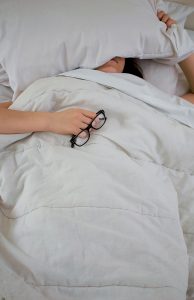
You’re awake from from dusk to dawn. Well, that’s the way it’s supposed to be anyway.
With the exception of owls, bats, and other select animals that stay up to hunt at night, you are a creature that is supposed to fall asleep soon after the sun goes down and awake with its reappearance at dawn.
Your Sleep Cycle
Sleep cycles have been governed by patterns of light and darkness for thousands of years. For all of human history, we have enjoyed 9 or more hours of sleep each night.
Your body is naturally encoded with hormones to respond to light and dark; you are sleeping with the natural rhythm of Mother Nature. In our world today, artificial light has changed the way most of us typically schedule our day-to-day lives.

We stay up longer at night by simply turning the lights on.
This means that most of us sleep for less than 7 hours at a time. To maximize good health, go back to the healthier natural sleeping cycles that you are meant to have by making a few small changes. Recognize that your reliance on indoor lighting exacerbates a disassociation from the natural cycles of light and darkness that preside over your sleep.
Change Your Lighting
You can mimic daylight by changing the type of your light.
- Sleeping without heavy drapery or shades forces you to wake up with the sun.
- If you have to have a curtain over your bedroom window (typically for security), a dawn simulator lamp will imitate the sunrise by growing steadily brighter with the coming of morning.

Changing your sleep patterns to be more in sync with the daily cycle of light and darkness is easier than you think.
You will have more energy when sleeping and waking rhythms are in alignment with sunlight. The different seasons also provide more waking hours in the summertime to spend outdoors, and you, like most other animals, can get plenty of sleep in the winter in order to recharge.
This is natural. This is healthy.

Two Sleep Hormones
Melatonin and Serotonin respond to light, or the lack of.
Melatonin is a hormone made by your pineal gland. It helps your body know when it’s time to sleep and when to wake up. Melatonin helps you fall asleep, improves your sleep quality, and can increase sleep duration. Normally, your body makes more melatonin at night, which makes you sleepy.
Serotonin is considered a neurotransmitter by some doctors, and considered a hormone by others. It is produced from the essential amino acid tryptophan in your intestines and in your brain. Serotonin is a chemical nerve cells produce, and it sends signals between your nerve cells. This makes you active and energetic during the day.
When the sun goes down, your melatonin kicks in. When the sun rises in the morning, your serotonin takes over. Makes sense, doesn’t it?
Enjoy a good night’s sleep. Turn off the lights, and we’ll see you in the morning.
_______________
If you want to learn more about healthy living, contact me at janethull.com. Remember that you are never alone when you are looking for good health!
Gain access to all of my online programs, ongoing support, monthly Q&A, and more by joining my Private Inner Circle Membership Program. I look forward to supporting you on your journey to alternative health and wellness.
_____________
Disclaimer: This article is for informational purposes only, and is educational in nature. The FDA may not have evaluated some of the statements. This article is not intended to diagnose, treat, cure, or prevent any disease. Please discuss with your own, qualified health care provider before adding supplements or making any changes to your dietary program.
Before taking vitamins, consult your doctor; pre-existing medical conditions or medications you are taking can affect how your body responds to multivitamins.
You have our permission to reprint this article if you attribute us with a live back-link to this article and the youtube links. https://janethull.com/